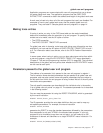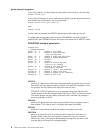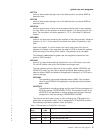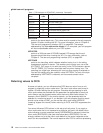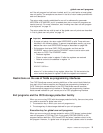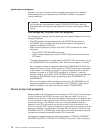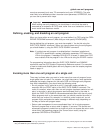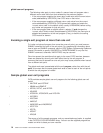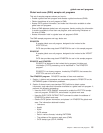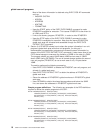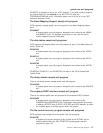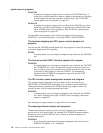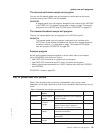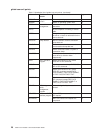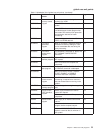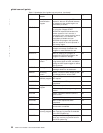Global work area (GWA) sample exit programs
This set of sample programs shows you how to:
v Enable a global user exit program and allocate a global work area (GWA).
v Obtain the address of an exit program’s GWA.
v Access CICS system information, and make that information available to other
global user exit programs.
v Share a GWA between global user exit programs, thereby making the information
it contains available to more than one program, and overcoming limitations on
the size of GWAs.
v Access information held in a global user exit program’s GWA.
The GWA sample programs and copy books are:
DFH$PCEX
A sample global user exit program, designed to be invoked at the
XPCFTCH exit.
CICS also provides copy book DFH$PCGA for use in this sample program.
DFH$ZCAT
A sample global user exit program, designed to be invoked at the XZCATT
exit.
CICS also provides copy book DFH$ZCGA for use in this sample program.
DFH$PCPI and DFH$PCPL
DFH$PCPI is designed to be invoked during program list table post
initialization (PLTPI) processing, and is described in “The DFH$PCPI
program”.
DFH$PCPL is a dummy program, invoked by DFH$PCPI, that causes the
XPCFTCH user exit to be driven.
The DFH$PCPI program:
DFH$PCPI consists of three main sections:
1. Section 1 obtains and processes any parameters passed to DFH$PCPI on the
INITPARMS system initialization parameter.
2. Section 2 shows how to use standard CICS facilities to obtain system
information, and make that information available to a global user exit program. It
performs the following processing:
v Uses the EXEC CICS ENABLE command to enable the XPCFTCH sample
user exit program, DFH$PCEX, and allocate it a global work area.
v Uses the EXEC CICS EXTRACT EXIT command to obtain the address of
DFH$PCEX’s global work area.
v Obtains CICS system information, and places it in DFH$PCEX’s global work
area. The information obtained includes:
– Job name
– Applid
– Sysid
– CICS release
– Date in various formats, including DATFORM
– The address of the common work area (CWA)
– CICS startup type (COLD, WARM).
global user exit programs
Chapter 1. Global user exit programs 15



